
JOURNAL OF MEDITERRANEAN STUDIES
Scope & Guideline
Advancing Scholarly Discourse in Mediterranean Studies
Introduction
Aims and Scopes
- Cultural and Linguistic Studies:
The journal emphasizes the exploration of cultural identities and linguistic dynamics within Mediterranean societies, examining how language influences identity and social structures. - Historical Contextualization:
A significant focus is placed on historical analysis, particularly regarding the interplay of different civilizations and the historical narratives that shape contemporary Mediterranean societies. - Political and Economic Analysis:
Research often addresses political developments and economic challenges faced by Mediterranean countries, with a critical lens on governance, crises, and social movements. - Interdisciplinary Approaches:
The journal encourages interdisciplinary research that combines history, sociology, anthropology, and cultural studies to provide comprehensive insights into Mediterranean issues. - Heritage and Memory Studies:
There is a notable interest in examining cultural heritage, memory, and the impact of historical events on contemporary identities and societal structures.
Trending and Emerging
- Identity and Bilingualism:
Recent publications increasingly explore the complexities of identity formation in bilingual contexts, reflecting broader societal changes and the impact of globalization on local cultures. - Political Extremism and Governance:
There is a growing focus on the rise of political extremism and its implications for governance in Mediterranean societies, marking a critical response to contemporary political climates. - Cultural Representation and Translation:
Scholarly attention is shifting towards the representation of marginalized voices and the challenges of cultural translation, indicating a move towards inclusivity in Mediterranean narratives. - Intergenerational Health and Social Determinants:
Emerging research emphasizes the long-term view of health determinants and social inequalities, particularly in marginalized communities, showcasing the intersection of health and historical context. - Critical Reflections on Race and Ethnicity:
There is an increasing trend in examining race relations and ethnic identities in the Mediterranean, reflecting a broader discourse on diversity and inclusion in contemporary societies.
Declining or Waning
- Traditional Maritime Studies:
Research specifically centered on traditional maritime trade and navigation has seen a decline, possibly due to the shift towards more contemporary issues affecting the Mediterranean. - Classical Antiquity Focus:
Although classical antiquity has been a staple in Mediterranean studies, there seems to be a reduced emphasis on this area in favor of modern and contemporary issues. - Regionalism and Localism:
The focus on specific regional identities within the Mediterranean has diminished, as broader, transnational themes gain prominence in the journal's discourse. - Religious Studies:
Studies exclusively centered on religious practices and their historical contexts are less frequently represented, indicating a possible shift towards secular sociopolitical themes. - Environmental Studies:
While environmental issues are critical, there has been a noticeable decrease in publications specifically addressing environmental challenges unique to the Mediterranean context.
Similar Journals
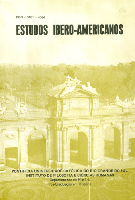
ESTUDOS IBERO-AMERICANOS
Illuminating Ibero-American Histories for a Global AudienceESTUDOS IBERO-AMERICANOS is a premier open-access journal dedicated to the exploration and dissemination of scholarly research in the field of Hispanic and Brazilian history. Published by the esteemed Pontificia Universidade Catolica do Rio Grande Sul, this journal has been a vital platform for academic dialogue since it commenced publication in 1994 and adopted open access in 2004, ensuring its accessibility to a global audience. With an impressive Q2 ranking in the History category and a robust position within Scopus ranks (825 out of 1760), it serves as a pivotal resource for researchers, educators, and students seeking to advance their understanding of Ibero-American studies. The journal's commitment to fostering rigorous scholarship is reflected in its comprehensive scope and dedication to publishing high-quality research that contributes to the academic community's knowledge and appreciation of the diverse narratives within Ibero-American history.
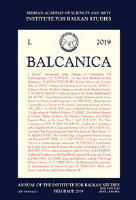
Balcanica
Bridging Disciplines for a Deeper Understanding of the BalkansBalcanica is a distinguished academic journal published by the Serbian Academy of Sciences and Arts, Institute of Balkan Studies, focusing on the multidisciplinary study of the Balkan region. With its roots tracing back to 1999 as an Open Access publication, Balcanica provides a platform for researchers and scholars to disseminate impactful findings pertaining to history, culture, politics, and economics of the Balkans. The journal aims to foster dialogue and understanding of the complexities within the Balkan context, not only serving as a vital resource for seasoned academics but also for students and professionals seeking comprehensive insights. By promoting scholarly exchange, Balcanica remains an influential repository of knowledge and a cornerstone for those dedicated to the advancement of Balkan studies, with a commitment to accessibility for a broader audience.

MODERN ASIAN STUDIES
Illuminating Contemporary Issues in Asian StudiesModern Asian Studies, published by Cambridge University Press, is a highly esteemed journal that encompasses scholarly research focused on the vibrant and complex narratives of Asian societies, cultures, and histories. With an ISSN of 0026-749X and an E-ISSN of 1469-8099, this journal has been at the forefront of Asian studies since its inception in 1967 and continues to evolve, striving towards excellence with a convergence period extending to 2024. It holds a prestigious Q1 ranking in History and Q2 rankings in both Geography, Planning, and Development as well as Sociology and Political Science as of 2023. With Scopus rankings placing it in the top 92nd percentile in History and maintaining significant standing in other social sciences categories, Modern Asian Studies provides invaluable insights for researchers, professionals, and students alike. Although not an open-access journal, it remains committed to disseminating impactful research that addresses critical issues within Asian studies, enhancing the academic discourse and contributing to a deeper understanding of the region's past and present.
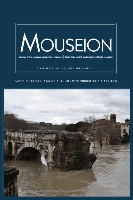
Mouseion-Journal of the Classical Association of Canada
Advancing scholarship in Classics and Archaeology.Mouseion - Journal of the Classical Association of Canada, published by University of Toronto Press Inc, stands as a vital academic resource in the fields of Classics and Archaeology. With a focus on promoting scholarly discourse, this journal provides a platform for original research, critical reviews, and interdisciplinary studies that engage with ancient cultures and their legacies. Since its convergence in 2019, Mouseion has quickly established itself within the academic community, achieving a commendable Q1 ranking in Classics and Q2 in both Archaeology categories in 2023, showcasing its commitment to excellence. While not an open-access journal, it is positioned among the top 29% of classics journals, reflecting its impact and the quality of publications. Nestled within Canada, this journal addresses a global audience of researchers, professionals, and students dedicated to the exploration of the classical world, and it endeavors to contribute significantly to the scholarly understanding of cultural heritage.

Egyptian Journal of Archaeological and Restoration Studies
Innovating Restoration Practices for a Timeless Legacy.Welcome to the Egyptian Journal of Archaeological and Restoration Studies, a vital resource for scholars and practitioners in the field of archaeology and restoration. Published by the renowned SOHAG UNIV PUBLICATION CENTER-SUPC, this journal aims to disseminate cutting-edge research that illuminates the rich archaeological heritage of Egypt and beyond. With ISSN 2090-4932 and E-ISSN 2090-4940, this journal showcases innovative methodologies and interdisciplinary approaches, significantly contributing to our understanding of cultural heritage preservation. The journal's growing influence is reflected in its Q3 ranking in multiple categories, including Archaeology, Conservation, and Cultural Studies as of 2023, alongside its noteworthy placement within the Social Sciences. Open access options provide wider accessibility to essential studies, making it an indispensable tool for researchers, professionals, and students alike. Join us in exploring the past and shaping the future of archaeological scholarship.

Spal
Uncovering the Past, Shaping the Future.Spal is a distinguished academic journal dedicated to the fields of Archaeology and History, published by the University of Seville, Editorial. With an ISSN of 1133-4525 and an E-ISSN of 2255-3924, it has established a prominent reputation within the scholarly community, currently enjoying an impressive Q1 ranking in Archeology (Arts and Humanities) and History, alongside a Q2 ranking in Archeology for 2023. The journal serves as a critical platform for researchers, professionals, and students alike, promoting the dissemination of cutting-edge research and innovative methodologies in these vital disciplines. Spal's Scopus Ranks place it in the 84th percentile for Arts and Humanities - History and the 72nd for Archeology within the field, emphasizing its impact and relevance in contemporary scholarship. Although it operates under a traditional access model, its commitment to advancing knowledge and discourse in archaeological and historical studies remains unwavering. The journal's coverage spans from 2015 to 2024, positioning it well to contribute to ongoing academic conversations and foster collaborations within the global research community.

Revista Espanola de Antropologia Americana
Exploring the Depths of American CulturesRevista Española de Antropología Americana, published by UNIV COMPLUTENSE MADRID, SERVICIO PUBLICACIONES, stands as a significant contribution to the field of anthropology, particularly focusing on American societies and cultures. Since its inception in 1970, this journal has evolved, with issues currently being published until 2024, providing a platform for original research, reviews, and scholarly discourse. Despite being a Q3 category journal in the 2023 rankings, it plays a pivotal role in disseminating knowledge and stimulating academic debate within the anthropology community. With an ISSN of 0556-6533 and an E-ISSN of 1988-2718, Revista Española de Antropología Americana strives to engage researchers, professionals, and students with insightful content that reflects the dynamic nature of cultural studies. Although it operates under traditional access models, the rich array of topics covered ensures its relevance to ongoing scholarly conversation in social sciences and anthropology. Addressing a diverse array of anthropological themes, this journal is essential for anyone looking to deepen their understanding of the cultural frameworks shaping American societies.

Historia-Santiago
Stimulating Scholarly Debate for a Deeper Understanding of HistoryHistoria-Santiago is an esteemed academic journal published by the Pontificia Universidad Católica de Chile, Instituto de Historia. Since its inception in 2000, the journal has embraced an Open Access model, facilitating broad dissemination of historical research and ensuring that critical scholarly work is freely accessible to researchers, professionals, and students around the globe. With a focus on Latin American history, Historia-Santiago provides a platform for innovative research and contributions that engage with diverse historical narratives and methodologies. The journal aims to foster interdisciplinary dialogue and stimulate scholarly debate, thereby enriching the understanding of historical contexts and their implications in contemporary society. By maintaining high academic standards, Historia-Santiago occupies a vital role in the field of historical studies, encouraging authors to explore new ideas and perspectives that shape the understanding of our past.
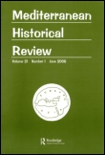
Mediterranean Historical Review
Illuminating Historical Perspectives from the MediterraneanThe Mediterranean Historical Review, published by ROUTLEDGE JOURNALS, TAYLOR & FRANCIS LTD, is an esteemed academic journal that has been a cornerstone of scholarship in the field of historical studies since its inception in 1986. With a rich focus on the cultural, social, and political dynamics within the Mediterranean region, this journal serves as a vital resource for researchers, professionals, and students alike, fostering a deeper understanding of the intricate historical narratives that shape contemporary society. Although it does not offer open access, the Mediterranean Historical Review boasts a commendable impact factor and ranks within the top quartiles of cultural studies and history, underscoring its significance in the academic community. With Scopus rankings placing it in the 76th percentile in Arts and Humanities (History) and notable positions in Cultural Studies and Sociology, the journal invites contribution from a diverse array of scholars dedicated to exploring the multifaceted past of the Mediterranean region. For those passionate about history, this journal is an indispensable platform for the dissemination of cutting-edge research and scholarly dialogue.
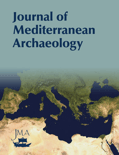
Journal of Mediterranean Archaeology
Pioneering Research in the Heart of the MediterraneanThe Journal of Mediterranean Archaeology, published by EQUINOX PUBLISHING LTD in the United Kingdom, is a premier academic journal dedicated to the exploration and dissemination of knowledge within the vibrant field of Mediterranean archaeology. Established in 1988, this journal has consistently demonstrated its commitment to scholarly excellence, attaining a Q1 ranking in various categories, including Archaeology and Arts and Humanities, making it a vital resource for researchers and students alike. With a prominent Scopus rank of #49 out of 413 in Archaeology, it places itself among the top-tier publications, reflecting its impact and relevance in contemporary archaeological discourse. Although the journal is not open access, its rigorous peer-review process ensures the publication of high-quality scholarly articles that contribute significantly to the understanding of the diverse cultural narratives within the Mediterranean region. As the journal moves toward its 35th anniversary, it continues to be a cornerstone for professionals seeking to share groundbreaking research and dialogue in this critically important area of study.